In August 2017, over 500 white supremacists descended upon Charlottesville, Virginia for a “Unite the Right” rally. There, Neo-Nazi James Fields plowed through a crowd of counterprotesters, leaving dozens injured and killing Heather Heyer. The events of the rally were harrowing, not only because they confirmed what many people of color already knew about white supremacists’ ability to organize and march freely, but also because of how it was planned.
To organize the Unite the Right rally, white supremacists utilized the popular, and private platform, Discord. The utilization of discord to plan a white supremacist rally — and the subsequent exposure of just how deep hate on the platform went — speaks to a larger trend of hate on gaming platforms. Initially designed for the gaming community. Discord’s use as a safe space for white supremacists online should spur questions about how and why gaming spaces, in particular, are used to promote and facilitate white supremacist violence.
Discord is far from the only platform that white supremacists have flocked to. Following the Christchurch shooting massacre, where 51 Muslims were killed during Friday prayers in New Zealand, the gaming platform, Steam, had to remove over 100 profiles praising the shooter. Kotaku reported that dozens of users on the site were “blatantly offering tribute” to the shooter. One profile even showed a GIF of the attack while others referred to the shooter as a “saint,” “hero,” and “Kebab Remover.”
This wasn’t the first time Steam harbored such blatant hate. In 2017, Motherboard reported that the platform was “full of hate groups,” attributing it to Valve’s hands-off approach to moderation. Then, in 2018, Reveal reported that Steam had 173 groups glorifying school shooters. One shooter, William Edward Atchison, frequently posted racist and violent content on Steam, according to the Daily Beast. Atchison killed two people during a shooting spree at a New Mexico high school.
Beyond gaming platforms themselves, there are also clear issues with popular gamers who espouse hate speech. When the Christchurch shooter released his manifesto, he pointed to popular gaming YouTuber PewDiePie, or Felix Kjellberg, as inspiration. He even went so far as to name drop Kjellberg on the live stream before the shooting started. The shooter’s reverence in regards to Kjellberg isn’t surprising because he has a long history of amplifying antisemitic and racist rhetoric.
White supremacy has rebranded itself as the alt-right, with its own counter-culture. In the Harvard Political Review, Rumi Khan noted the long history of alt-right leaders building their platforms through the gaming community. Khan wrote:
“Alt-right leaders have long realized the reactionary potential of the hardcore gamer community, a community that is generally white, male, middle class, socially frustrated and perpetually online. Steve Bannon, perhaps the icon of the mainstream alt-right, got his start by radicalizing disgruntled World of Warcraft players. The arena of alt-right congregation include platforms like Reddit, 4chan and Discord, all platforms with significant populations of, if not explicitly aimed at, gamers.”
Sometimes, the hate seen on gaming platforms is dismissed as irony or satire. Doing so allows white supremacy to continue developing bases across platforms. According to Keegan Hankes, a senior research analyst at the Southern Poverty Law Center, they’re also “absolutely a path toward indoctrination.”
“You have people on like Andrew Anglin who state openly that all of their humor and all of their extremely base kind of vitriolic and in-your-face, no-attempt-to-hide-it racism is attempting to desensitize,” Hankes told Slate. “Once they can get somebody to laugh at the Holocaust, it’s much easier to work backward and get them to think that white people are being oppressed systemically by Jews and people of color, is their argument.”
The hate boiling within the gaming community can no longer be dismissed. Allowing white supremacists to organize themselves online poses a direct threat to already marginalized and vulnerable people. Companies like Discord and Valve need to think long and hard about why their platforms were so appealing to white supremacists — and why they’ve been emboldened enough to carry on using them.
















